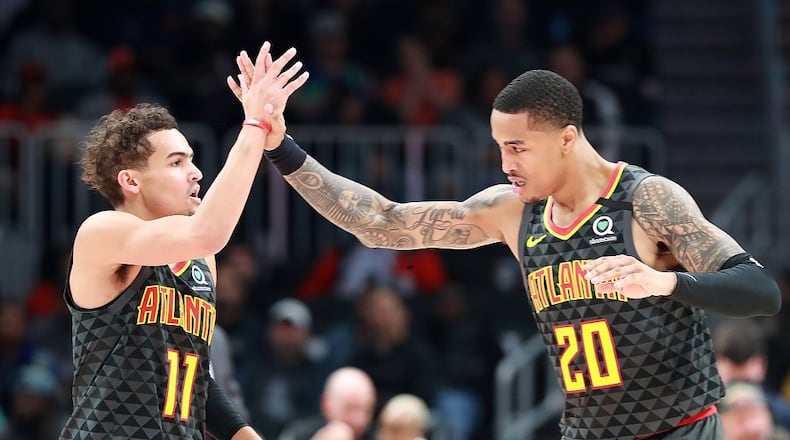If you find yourself growing impatient with the Hawks’ rebuild, John Collins offered some reassuring words.
“I want them to know we’re not as far away as you think,” Collins said.
Collins enjoyed historic success on an individual level this season, or at least the portion of the season already in the books (the NBA suspended play March 11 because of the coronavirus, and it's still unclear if regular-season games will resume, or if the league will decide to go straight to some form of the playoffs). As a team, though, the Hawks (20-47) struggled and were on pace to finish with fewer wins than the previous season (29-53).
On one hand, the Hawks had one of the worst defenses in the league, tough injury breaks and Collins' 25-game suspension set them back, they often utilized a starting lineup with no player older than 22 and they got minimal help from the team's veterans. On the other hand, many of those expiring contracts already have been flipped to improve the roster, an exceedingly young team became more experienced, they got better toward the end of the season (with 15 games still outstanding) and they'll have a high draft pick to give them a boost.
Where do the Hawks, and Collins, go from here? Up, if you ask the third-year power forward, who is up for a rookie extension. Collins could become the longest-tenured player on the team, depending on what happens in free agency (DeAndre’ Bembry, set to become a restricted free agent, predates Collins by one season).
“This is just to me, with the roster moves, with the experience that we have gained and are going to gain over the summer, and chemistry, I keep on hearing us being talked about as a fringe playoff team, and I just want to start pushing our team and our discussion in the spaces, in the mental spaces of people as a playoff contender every year,” Collins said.
“I feel like once we prove that, and put that into the world, we’ll get that respect. … I feel like we’re very close. The young talent that we have and chemistry and intensity and the style we play with, the fact that we like each other, all that plays a big role going forward. We’re pretty close, we’re just under the radar. We’re young. A lot of tough stuff, tough breaks happen, but that’s just the NBA. That’s just the way it is.”
This season, the Hawks' "Core Five" emerged, consisting of Collins, second-year players Trae Young and Kevin Huerter and rookies Cam Reddish and De'Andre Hunter. All five of those players will return next season, as will center Clint Capela, who the Hawks acquired in a trade deadline deal and could solve their problems at center, if he's healthy.
This season provided a learning experience for the young group, per Collins, both in accruing playing time and feeling each other out. Hawks general manager Travis Schlenk and coach Lloyd Pierce have repeatedly referred to that handful of players as the group the franchise is rebuilding around.
Pierce has said the Hawks will be a playoff team next season, which isn't outside the realm of possibility considering they're in the East, though it would require surrounding the Core Five with more talent. (Schlenk has said he's looking to add depth in free agency, which could help the struggling second unit that can't score without Young.) They're projecting to have just under $50 million in cap space, but the cap could take quite a hit because of financial losses from COVID-19.
“The next step was getting our feet wet on the court together, especially De’Andre, Cam and Bruno (Fernando), for those guys to just get reps, get experience, mess up, do things correctly, do things sort of in the middle and figure out what pace they need to play at and where they need to improve,” Collins said.
“Guys such as Trae, myself and Kevin, second- and third-year guys, it’s for us to keep developing the chemistry we have and keep developing our games. Try to be the best young core we can, so when the time comes for us to get to the playoffs, we have the youth and the experience, which I feel can be very deadly.”
On an individual level, Collins put up impressive numbers as one of the five players in the league to average a 20-plus points and 10-plus rebounds per game, with 21.6 points and 10.1 rebounds. The other four players: Milwaukee’s Giannis Antetokounmpo (29.6 points, 13.7 rebounds), Philadelphia’s Joel Embiid (23.4 points, 11.8 rebounds), Minnesota’s Karl-Anthony Towns (26.5 points, 10.8 rebounds) and Denver’s Nikola Jokic (20.2 points, 10.2 rebounds).
His efficiency was unreal, shooting 58.3% from the field, 40.1% from 3-point range and 80% from the line. Granted, it’s a smaller sample size of 41 games, factoring in his suspension.
Collins shot 34% on 3-point shots as a rookie and 34.8% in his second season, so he made a sizable leap in that category. He also was more active on defense and went from 0.6 blocks per game last season to 1.6 this season, though it’s a little hard to gauge Collins’ defensive skills when the Hawks collectively were so bad on that end.
From the Hawks’ win vs. Phoenix on Jan. 14 to their win vs. Portland on Feb. 29 (22 games), Collins made at least five field goals in each and shot 50% or better from the field, which is the longest stretch in franchise history.
"If you're healthy, and you're playing, and you're playing like this, you're our second All-Star,'" Pierce told Collins during that hot streak, which would put him in the same category as Young, who started in this year's All-Star game in his second season in the league.
“I just felt like it was an all-around good year for myself,” Collins said. “It felt like I showed development in certain areas that a lot of people, I guess critics, were looking to see development from. I just felt like for everybody watching, my game is continuing to develop, continuing to grow. I just hope that’s what people see.”
Within seconds of watching Collins, it becomes apparent he's a standout roller and lob threat (especially when paired with a standout playmaker like Young), but he also takes pride in his versatility. That's what gives him confidence that he and Capela will fit well together, even though it seems their skill sets overlap considerably. The addition of Capela, who is a rim-runner and doesn't shoot from distance, might open up some more 3's for Collins, he hopes, as Capela draws in defenders.
It will also allow Collins to slide from center back to his natural position at power forward.
“I’m pretty versatile, so I feel (like) for the people who don’t watch, when they do watch, it’s like ‘OK, John can stretch the floor,’” Collins said. “‘Oh wow, John and Clint can play well (together), Clint’s still doing his thing rolling and playing above the rim, and I’m still playing above the rim, because we have elite playmakers out there on the court… Clint fits right in to what we do, so it’s not like he comes in and messes anything up on my end.”
The 20-and-10 numbers raise eyebrows, and Collins is happy to have surpassed that milestone after narrowly missing it last year (when he averaged 19.5 points and 9.8 rebounds per game). But, he understands that it’ll be less of a focus if the Hawks take off and start winning.
“I take a certain amount of pride in it,” Collins said. “I feel like the more my career goes on, the more we start winning, the less emphasis it would take. But obviously with certain circumstances, with us being a young, rebuilding team, I feel like numbers matter… I just feel like, for most basketball lovers, basketball fanatics, just seeing the 20-10 is a nice marker to look at for a big man.”
Moving forward, Collins wants to become more of a facilitator who can create for both himself and others, and he wants to keep improving on defense.
And, to make it clear, he wants to be a Hawk. He wants to help turn Atlanta into a winning team (this would mark the third straight season of missing the playoffs, after making the playoffs 10 years in a row from 2007-2008 to 2016-2017).
Collins has one year remaining on his rookie deal, and if the Hawks do not extend him this offseason (his suspension and the truncated season may work against him, whenever that comes around), he will be a restricted free agent after next season. That doesn’t mean that he and the Hawks couldn’t eventually work out a deal, but it would muddy the waters a bit and thrust Collins into a “contract year.”
For his part, Collins thinks he could be in the conversation for a max deal, and he’d rather figure out his contract situation sooner rather than later.
“When we’re talking max numbers and money, I feel like I definitely (am in) the conversation to have earned that money with the Hawks specifically, but obviously I know there’s business and we don’t always get exactly what we want,” Collins said. “But I want to be a Hawk, I want to stay with the Hawks.”
“I feel like we’ve both invested ourselves in each other… I feel like we both want to see our investments in each other pay off. In that sense, I just want to know where I am. I want to know I’m locked in as soon as I can rather than having to wait, which I know happens, but when you do wait, a lot of other stuff mentally creeps in during the season while I’m tired, while I’m playing, ups and downs, injuries, but that’s also a part of just being a pro athlete.”
Whether an extension comes this offseason or not, Collins will be with the Hawks for another year as the young core tries to take a big step forward, and he’ll no doubt be a big factor if they achieve that.
“We just see that potential, and we taste that, and we just want to keep getting more of that,” Collins said. “That’s the motivation for us to continue to grow together.”
About the Author
Keep Reading
The Latest
Featured

